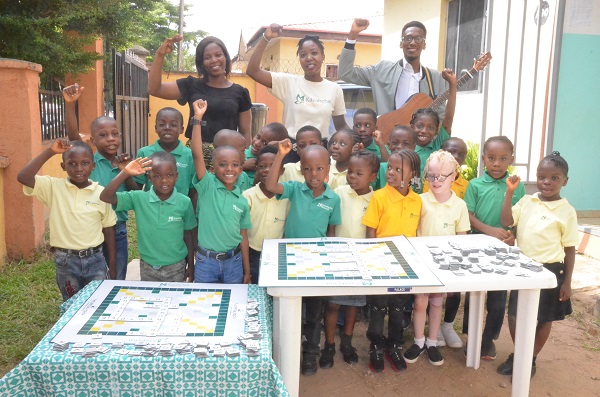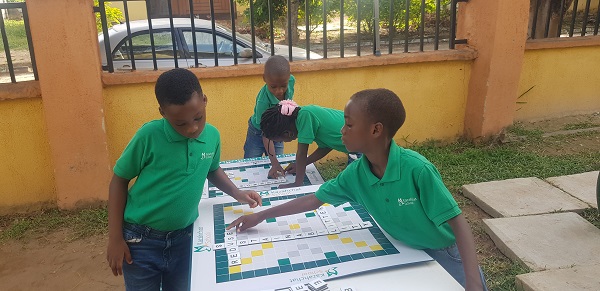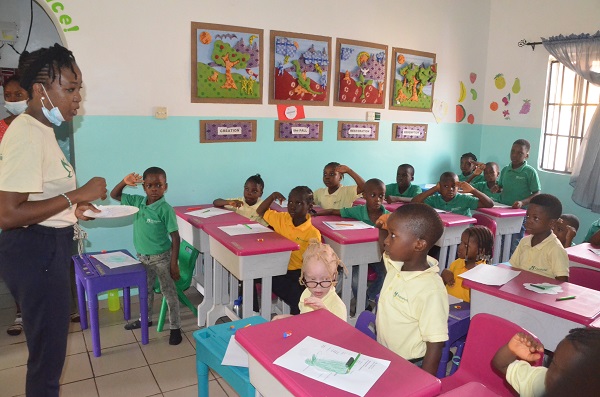
As Nigeria prepares to join world leaders to deliberate on environmental issues at the international environmental meeting billed to hold in Stockholm, Sweden, between June 2 and 3, 2022, the education director, Kazahchat School Kuje, Abuja, Fumilayo Akinwale, has given the rationale behind the school’s commitment to raising young, climate change champions.
Speaking during an exclusive interview with Science Nigeria during Kazahchat’s Environment Day, yesterday, the educationist said catching them young is the best rationale to have adults responsible for the environment in the future.
The Kazahchat’s Environment Day was co-created by the United Nations Development Programme (UNDP) as part of Nigeria’s side event at the Stockholm Assembly with the theme “Stockholm+50: a healthy planet for the prosperity of all – our responsibility, our opportunity”.
Akinwale highlighted that raising children who will become change agents in all spheres of life, including the environment, fits into the school’s vision (to be the model sustainable school for quality basic education in Nigeria) and mission (to raise a generation of patriotic leaders who would solve and bring solution to the needs of their communities across Africa) ultimately.
The educationist stated that the school designates a sustainability/environment day because it forms part of the school’s five, core values, seeing as sustainability is one of uttermost importance.
“For us, sustainability means thinking about the environment and environmental factors, as well as economic and social factors. So, whatever we are doing now, we are not only thinking about our generation but the generation coming behind us.

“We want to be a platform for raising children to think about sustainability. So, we dedicate a day like this where we introduce them to the basis of sustainability and, for today, we are narrowing down to the environment and climate change so that they know the implications of their actions on the environment.
“In Kazahchat our motto is learning for service. So, we are raising service leaders and as part of that they’re committed to be climate change agents. At their level what do they know or how can they contribute and take action?
“Number one; we have talked about how they dispose waste. We teach them to reduce, reuse, recycle. We are a low-cost school [and in] most of the things we use we try to minimise waste and, also, try to see how we can reuse items. “When we find plastic bottles, old tyres, we find other ways of using them. Actually, we do a lot of thinking about our environment here in daily living and, for the children, if you can catch them young it’ll become a lifestyle,” she stated.
Highlighting some of the role’s government and other stakeholders can play in sensitising Nigerians on the importance of being responsible to the environment, she opined that education and advocacy have key roles to play.
“Education is still a thing. Education at all levels, both formal and informal institutions and communities, working with non-governmental organisations/partner organisations to educate because there are some low hanging fruits that can be reached.
“A lot of things can be done around advocacy. Everything doesn’t have to cost a lot of money, it is about information, education, awareness, publicity and working with schools, NGOs, religious organisations as well. There’s a lot that can be done. Once everybody puts their hands together, we will have a more sustainable Nigeria which we are very passionate about and a more sustainable Nigeria,” she added.

In his remarks, a pupil, Emmanuel Ike, pointed out that climate change and unsustainable human activities are responsible for the desertification in the northern part of the country. He said the environment can be restored through conscious efforts such as reduction of tree-felling and increased tree-planting.
He posited his desire to be a climate champion by talking to his parents and communities to adopt more sustainable approaches in dealing with the environment.
Another pupil, Oge Destiny, said as part of her contribution as a climate change agent she will correct people who dispose plastics.
“I will be a climate change agent in the community. Since plastic bags spoil the soil, when I see people throwing things on the ground, I can correct them and make them know those things damage the soil.
“Plastic bags can stay up to 500 years or forever. We need to be climate change agents to help the soil regain its fertility,” she added.
In his remarks, the team head of the environment and climate change (ECC) unit of the UNDP Nigeria, Mr. Muyiwa Odele, pointed out that the school uses innovative teaching aids and curriculum to communicate complex principles into life lessons and skills that young children can imbibe at tender ages for life-long impact.
“It shows that people are leading actions that contribute to the vision of sustainable development and Stockholm Plus 50. Clearly, this is safeguarding the future,” he added.


